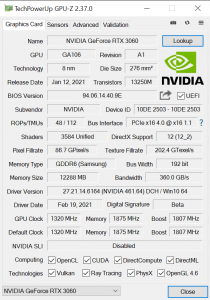
Since the launch of Nvidia's Ampere architecture last year, we have seen a number of GPUs hit the market with very high TDPs, perfectly illustrated by RTX 3080 and RTX 3090 which both consume over 300W of power. This meant board partners had to design some seriously large coolers to deal with such high-power silicon. With the RTX 3060, however, we are starting to see a shift in thinking. With its 170W TDP, Palit has been able to design a single-fan card that is barely longer than a x16 PCIe slot.
To start with an interesting fact, since the launch of the RTX 30-series last September, I've not reviewed a single graphics card from one of Nvidia's board partners that wasn't a triple-fan card. There's nothing inherently wrong with such cards, but more fans of course means more space required, so the coolers from the likes of ASUS, MSI and Gigabyte have all been pretty large.
Not so for the Palit RTX 3060 StormX OC. This card measures just 170mm long, utilising a single 100mm fan, while its heatsink design is also fairly basic. Is this card good enough to handle the 170W GA106 GPU? That's what we will find out today.
| GPU | RTX 3090 | RTX 3080 | RTX 3070 | RTX 3060 Ti | RTX 3060 |
| SMs | 82 | 68 | 46 | 38 | 28 |
| CUDA Cores | 10496 | 8704 | 5888 | 4864 | 3584 |
| Tensor Cores | 328 | 272 | 184 | 152 | 112 |
| RT Cores | 82 | 68 | 46 | 38 | 28 |
| Texture Units | 328 | 272 | 184 | 152 | 112 |
| ROPs | 112 | 96 | 96 | 80 | 48 |
| GPU Boost Clock | 1695 MHz | 1710 MHz | 1725 MHz | 1665 MHz | 1777 MHz |
| Memory Data Rate | 19.5 Gbps | 19 Gbps | 14 Gbps | 14 Gbps | 15 Gbps |
| Total Video Memory | 24GB GDDR6X | 10GB GDDR6X | 8GB GDDR6 | 8GB GDDR6 | 12GB GDDR6 |
| Memory Interface | 384-bit | 320-bit | 256-bit | 256-bit | 192-bit |
| Memory Bandwidth | 936 GB/Sec | 760 GB/Sec | 448 GB/Sec | 448 GB/Sec | 360 GB/sec |
| TGP | 350W | 320W | 220W | 200W | 170W |
Despite utilising new GA106 silicon, RTX 3060 isn't actually a full implementation of the GPU, as it has 28 streaming multiprocessors (SMs) instead of 30. Currently only RTX 3060 for laptops uses the full GPU. For the desktop chip, 28 SMs means a total of 3584 CUDA Cores, as thanks to Ampere’s new SM structure with its two FP32 datapaths, each SM houses 128 CUDA cores.
Ampere also places one RT core, and four Tensor cores, in each SM, giving a total of 28 RT cores and 112 Tensor cores. This is accompanied by 112 texture units, and 48 ROPs which are now housed directly within each graphics processing cluster (GPC), with 16 ROPs per GPC, and 3 GPCs in total for RTX 3060.
Interestingly, rated clock speed is the highest it has been for an Ampere GPU, coming in at 1777MHz for the reference spec. This Palit StormX OC model however, has increased this to 1807MHz, and we test real-world clock speed behaviour later in this review.
There's been a lot of talk about Nvidia's decision to use 12GB GDDR6 memory for the RTX 3060. This is more than the RTX 3060 Ti, RTX 3070 and even RTX 3080, but crucially the memory interface is much narrower at 192-bit. With memory clocked at 15Gbps, total memory bandwidth comes in at 360GB/s, about 20% lower than the RTX 3060 Ti.
Lastly, for total graphics power, Nvidia rates the RTX 3060 for 170W, which is 30W less than the RTX 3060 Ti. Despite being factory overclocked, the StormX OC also shares this TGP rating.
 KitGuru KitGuru.net – Tech News | Hardware News | Hardware Reviews | IOS | Mobile | Gaming | Graphics Cards
KitGuru KitGuru.net – Tech News | Hardware News | Hardware Reviews | IOS | Mobile | Gaming | Graphics Cards




